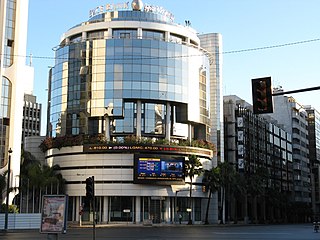Related Research Articles
Bank of Africa Red Sea is the second largest bank in Djibouti and is part of the Bank of Africa (BOA) Group. Bank of Africa Group, by then based in Mali, acquired Djibouti-based Banque Indosuez Mer Rouge in 2010. BOA Red Sea operates seven branches in Djibouti and a representative office in Addis Ababa.
Banque pour le Commerce et l'Industrie – Mer Rouge (BCIMR) is a bank in Djibouti. It has a market share of around 45%, and is the largest bank in the Horn of Africa. BCIMR is a subsidiary of the French bank BRED Banque populaire, which owns a 51% share in the company. The Government of Djibouti and a Yemeni bank own the remaining 33% and 16% shares, respectively. BCIMR has a branch in Hargeisa, situated in the self-declared Republic of Somaliland, internationally considered to be part of Somalia.

Banque Populaire was a French group of cooperative banks, with origins in the European cooperative movement. In 2009, it merged with Groupe Caisse d'Épargne to form Groupe BPCE.

Bank of Africa (BOA) is an international financial services group headquartered in Casablanca, Morocco. It was formed through the 2010 acquisition of Bank of Africa by the Banque Marocaine du Commerce Extérieur, following which BMCE rebranded its commercial operations as Bank of Africa in 2020. The BMCE name survives in the byline "BMCE Group" incorporated in the BOA brand identity.

Groupe Caisse d'épargne was a group of French savings banks that were converted into cooperative banks by legislation enacted in 1999. Its roots went back to the founding in 1818 of the Caisse d'Épargne et de Prévoyance de Paris, initiated by Benjamin Delessert and the Duke of La Rochefoucauld-Liancourt.

BPCE is a major French banking group formed by the 2009 merger of two major retail banking groups, Groupe Caisse d'Épargne and Groupe Banque Populaire. As of 2021, it was France's fourth-largest bank, the seventh largest in Europe, and the nineteenth in the world by total assets. It has more than 8,200 branches nationwide under their respective brand names serving nearly 150 million customers. Its wholesale banking subsidiary Natixis, previously a separately listed company, was delisted and came under full ownership of Groupe BPCE in 2021.
Nicolas Mérindol, is a French Business executive who was the former CEO of the Groupe Caisse d'Épargne. Since July 2012 he has been the Chairman and Partner of Amilton, a financial services group.

Banque Internationale à Luxembourg S.A. is the oldest private bank in Luxembourg. It offers commercial and corporate banking services, and was the country's third-largest employer by 2011, with 3,640 employees. Since 2018, it has been majority-owned by China-headquartered Legend Holdings. The bank has offices in Luxembourg, Switzerland and China.
BRED is one of the cooperative banks part of Groupe Banque Populaire in France. It was founded in 1919 by Louis-Alexandre Dagot in Vincennes. As of 2018, the Bank has a network of 400 local branches in France. 30% of its 6,600 employees are located outside France and in French overseas collectivities. It has 5.8 billion euros of shareholders equity.
The Banque de commerce et de développement, or BCD, was a short-lived state-owned bank in Burundi.

The Caisse Centrale de la France Libre was a bank of issue established by Free France in London in 1941, serving French Equatorial Africa and Cameroon following their de facto secession from Vichy France. It soon evolved into a specialized note-issuing and development bank for French overseas territories and was renamed the Caisse Centrale de la France d'Outre-Mer in early 1944, then the Caisse Centrale de Coopération Économique in 1958.

The Banque de la Guadeloupe was a bank of issue on the island of Guadeloupe, France. It was established in 1853, lost its monetary role in 1944, and merged in 1967 with the Banque de la Martinique to form the Banque des Antilles Françaises (BDAF).

The Banque de la Réunion was a bank of issue on the island of Réunion, France. It was established in 1853, lost its monetary role in 1944, and in 2015 became a fully-owned subsidiary of Caisse d'Épargne Provence Alpes Corse (CEPAC).
References
- ↑ "Liste des institutions financières en activité et agréées par la Banque Centrale de Djibouti". Banque Centrale de Djibouti. Retrieved 19 December 2024.
- ↑ Dalsan Radio (24 February 2020). "Kenya: Djibouti's East African Bank Distance Self From Kenya Registered Bank" (via AllAfrica.com). Mogadishu: Dalsan Radio. Retrieved 24 February 2020.